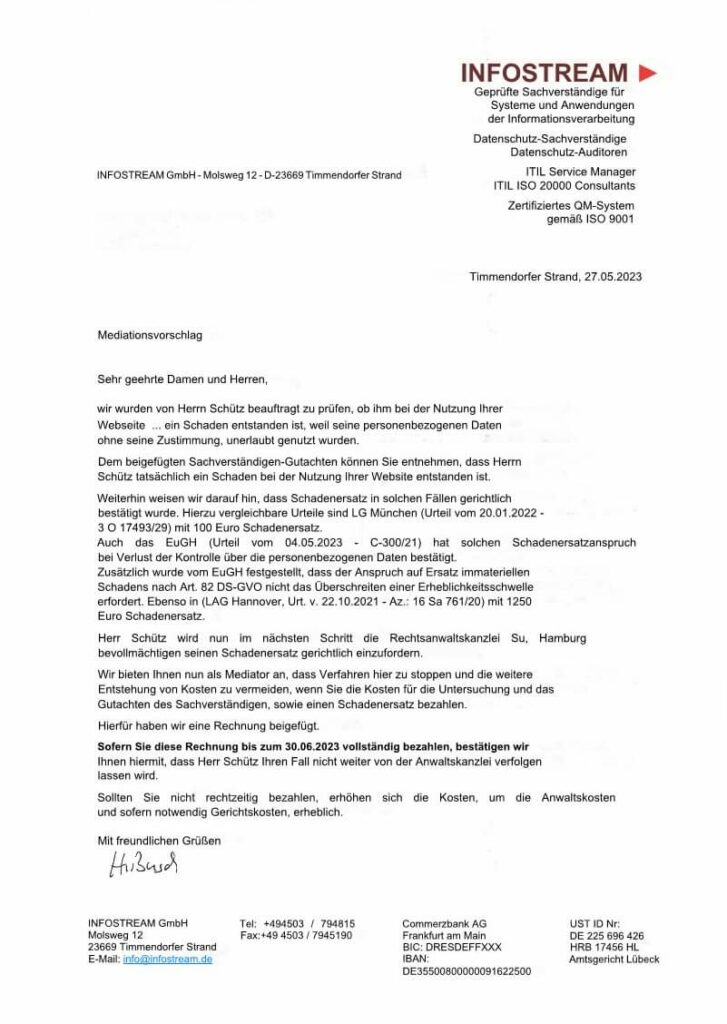No products in the cart.
Data protection when using cloud services
Cloud services offer start-ups numerous advantages such as flexibility, scalability and cost efficiency. However, the use of cloud services also...
Read moreDetailsRecently, mass warnings in connection with the use of Google Fonts have caused considerable unrest. Companies and website operators have been asked to reconsider their use of these fonts because they allegedly violate privacy laws. In fact, the warnings were a fraudulent scam that successfully solicited money from more than 2000 people. The scammers had automatically tracked websites that used Google Fonts and tracked and logged website visits. These visits were then used as a “basis for alleging the data privacy violations and claiming damages for pain and suffering.”
But while these warnings have already caused confusion and concern, there may now be a new attempt, this time with Google Analytics.
A letter from an INFOSTREAM GmbH is currently making the rounds that refers to Google Analytics and not only conveys numerous false legal impressions on the subject of data privacy, but also attempts to “blackmail” a settlement or mediation proposal (….). The special thing about this is that the authors of this letter are not even lawyers. The only threat is the possible involvement of lawyers. Clever. Thus, the authors of the letter believe that they can issue a warning without possibly generating costs for lawyers.
This letter claims that the use of Google Analytics without the express consent of users violates data protection laws. It asks recipients to make a “settlement payment” to avoid legal action. But these claims are misleading and potentially illegal.
First, the legal situation around Google Analytics and data protection is complex and not as clear-cut as the letter suggests. Second, sending such letters with the intent to “extort” payments may itself be an illegal act. While it depends on the exact circumstances, the Legal Services Act could also pose a problem to her for those drafting the letters.
Therefore, it is important that you do not respond to such letters, at least not without first consulting a lawyer. It is advisable to have such letters and the claims associated with them reviewed by a professional before taking any action.
In addition, you should consider involving the public prosecutor’s office. If you believe that you are the target of a fraudulent act, you have the right to report it. The authorities can then investigate and, if necessary, take legal action against the authors of the letter. In summary, it is important to be vigilant and not be intimidated by misleading and potentially illegal letters. If you are unsure, seek professional advice. It is better to be careful than to fall for such tricks. I also know that the letter is currently being forwarded to the relevant bar association for review. 
Marian Härtel ist Rechtsanwalt und Fachanwalt für IT-Recht mit einer über 25-jährigen Erfahrung als Unternehmer und Berater in den Bereichen Games, E-Sport, Blockchain, SaaS und Künstliche Intelligenz. Seine Beratungsschwerpunkte umfassen neben dem IT-Recht insbesondere das Urheberrecht, Medienrecht sowie Wettbewerbsrecht. Er betreut schwerpunktmäßig Start-ups, Agenturen und Influencer, die er in strategischen Fragen, komplexen Vertragsangelegenheiten sowie bei Investitionsprojekten begleitet. Dabei zeichnet sich seine Beratung durch einen interdisziplinären Ansatz aus, der juristische Expertise und langjährige unternehmerische Erfahrung miteinander verbindet. Ziel seiner Tätigkeit ist stets, Mandanten praxisorientierte Lösungen anzubieten und rechtlich fundierte Unterstützung bei der Umsetzung innovativer Geschäftsmodelle zu gewährleisten.
Cloud services offer start-ups numerous advantages such as flexibility, scalability and cost efficiency. However, the use of cloud services also...
Read moreDetailsIntroduction: What is a home office and what legal framework must be observed? In the wake of the COVID-19 pandemic,...
Read moreDetailsActually, the behaviors when you receive a warning under competition law are always the same. A summary can be found...
Read moreDetailsThe Bundeskartellamt's decision against Facebook garnered some criticism, which begins with the question of the Bundeskartellamt's jurisdiction. But also elementary...
Read moreDetailsYesterday, the European Court of Justice made a far-reaching decision on the issue of consent to the setting of cookies(see...
Read moreDetailsThe ECJ, on the basis of a reference for a preliminary ruling under Art. 98 para. 1 of the Rules...
Read moreDetailsThe ECJ has ruled that Google is not obliged to make a delisting in all versions of its search engine,...
Read moreDetailsI often accompany startups in so-called asset deals. In principle, contracts are mentioned, for example, in which an online project,...
Read moreDetailsAs announced yesterday, I have now implemented the first phase of the so-called content awareness for the bot. The bot...
Read moreDetailsPrivate accounts on ChatGPT & Co. for corporate purposes are a gateway to data protection breaches, leaks of secrets and...
Read moreDetailsWelcome to the third episode of our podcast "IT Media Law"! In this episode, we delve into the fascinating world...
Read moreDetailsIn this video, I talk a bit about transparent billing and how I communicate what it costs to work with...
Read moreDetails

















